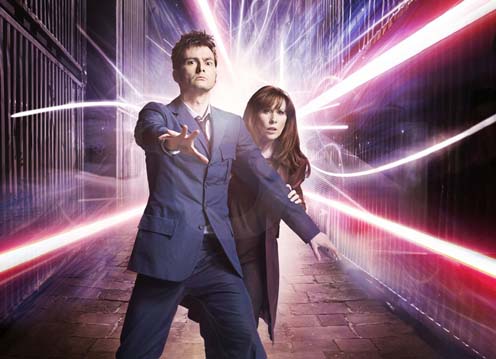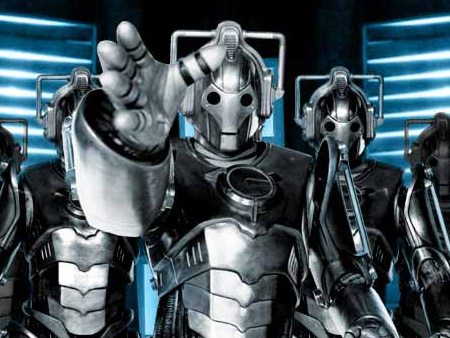Fourth ‘Doctor’ Season Brings New Alien Agendas, Part 1
 More hideously scary monsters are coming to the new season 4 of the smashing British sci-fi series Doctor Who. Like the Cybermen, a race of metallic soulless humanoids who want to “upgrade” all humans to be like them, this threat arises from a surprising source and threatens the existence of planet Earth, by compelling people to be subject to certain extraterrestrial modes of thought.
More hideously scary monsters are coming to the new season 4 of the smashing British sci-fi series Doctor Who. Like the Cybermen, a race of metallic soulless humanoids who want to “upgrade” all humans to be like them, this threat arises from a surprising source and threatens the existence of planet Earth, by compelling people to be subject to certain extraterrestrial modes of thought.
And it’s courtesy of none other than Doctor Who’s very executive producer and head writer, Russell T. Davies.
“Wait wait wait wait!”
While I say that, please imagine me holding up my hands in a faux-panicked manner, reminiscent of the Tenth Doctor, right before I whip out a clever solution to avoid being killed. This is because, unlike some Christian writers and culture pundits, I seem to find myself unafraid of Davies’ own ideological invasions.
‘Upgrading is compulsory’
 Davies, who re-launched the new TARDIS and its time-traveling, world-saving Time Lord occupant(s) in 2005, is “the most influential gay man in Britain,” according to an April 6 London Independent article. Well, I kind of already knew that. But furthermore — well, especially if you have Christian friends who enjoy sending you dozens of email forwards, you’ve surely heard of British evolutionary biologist Richard Dawkins? He’s the same guy who looks stupid in Ben Stein’s anti-evolutionary-dogma documentary Expelled. Well, it seems Dawkins is having a cameo in the new Doctor’s season 4.
Davies, who re-launched the new TARDIS and its time-traveling, world-saving Time Lord occupant(s) in 2005, is “the most influential gay man in Britain,” according to an April 6 London Independent article. Well, I kind of already knew that. But furthermore — well, especially if you have Christian friends who enjoy sending you dozens of email forwards, you’ve surely heard of British evolutionary biologist Richard Dawkins? He’s the same guy who looks stupid in Ben Stein’s anti-evolutionary-dogma documentary Expelled. Well, it seems Dawkins is having a cameo in the new Doctor’s season 4.
“People were falling at his feet,” says Davies, creator of the BBC’s flagship show. “[. . . I]t was Dawkins people were worshipping.”
As writer and executive producer of Doctor Who, Davies often plays with religious imagery (from a cross-shaped space station to robot angels with halos), but he’s a fervent believer in Dawkins. “He has brought atheism proudly out of the closet!”
Later, Davies unabashedly unveils the purpose behind Captain Jack Harkness — an openly “bisexual” character who pretty much hits on everybody, guy, girl or extra-Earth species. The idea is not only to help people tolerate homosexual beliefs, but to encourage children to “come out of the closet” themselves. “If there is one kid now doing that, then in 10 years’ time there will be thousands of kids, and 10 years after that, every kid who wants to will be doing that,” Davies said. “Isn’t that brilliant?”
Intriguing! Somehow the image of the Cybermen enters my mind. “[We are] the next level of mankind. We are Human Point Two. Every citizen will receive a free upgrade. You will become like us. . . . Upgrading is compulsory.” Meanwhile, as for lingering cultural opposition to becoming one with Cybermen? “De-lete. De-lete. De-lete.”
The heart of the TARDIS
One might be a bit unsure why I’m not bothered about this stuff. Is there something wrong with me? Am I a compromising Christian? perhaps one of those quasi-backsliders who’s just being deceived by awesome characters, spectacular special effects and epic good-versus-evil storytelling?
It’s that last element, actually, that seems the best reason. Because while Davies and other writers are putting in evolutionary and even gay-rights junk, they’re also putting in really “fantastic!” messages of redemption, either intentionally or incidentally.
Though the program has its “moments” — innuendo here, a double entendre there — and is based solidly in an evolutionary, everything-supernatural-is-just-advanced-science view, the heart of the TARDIS pulses with remnant energy of a very Judeo-Christian worldview, similar to the warp core of the starship Enterprise. In the Doctor’s adventures, conformity, racism, and evil domination are upended and destroyed. True love, care for people and devotion are upheld. The Doctor is sorry when he cannot save lives — or is forced to take one — and overjoyed when “everybody lives!” as he exclaims in the finale of The Doctor Dances.
But then, goes a legitimate argument, can’t other religions find hints of their views in Doctor Who? And doesn’t it directly oppose Christianity with ideas such as that of The Satan Pit, which is that there’s just one demonic creature in deep space, sending out thought waves that make all kinds of religions believe there really are more-powerful devils and monsters?
Well, perhaps. And it’s true that general-issue moral messages do not make a story Christian. But if we dismiss the Doctor as void of Christian virtue, then we might as well also throw out a lot of “Christian”-labeled books and movies that also imply humans are decent and God-fearing on their own, without much input from Him. Anything that doesn’t directly reference the message of Redemption — that Christ, the Creator/Savior, died to save sinners who deserve and merit nothing from Him on their own — is not truly Christian.
And it’s that message of redemption that makes Doctor Who imbued with Christian influence — a topic I’ll be exploring further in the second installment of this short serial.
(In closing, though, hello again to the Spec-Faith contributing “staff” and its readers. Yes, I have been absent for a time, traveling the universe, but I’ve just recently returned to this planet and I hope I can stay for a while. Thanks for your patience, and I hope to be around more in the coming months!)








































[…] Last week’s column (my first in a long time on Speculative Faith) focused on not-so-hidden intellectual invasions inherent in Doctor Who, courtesy of the British sci-fi programme’s head writer/producer, Russell T. Davies. […]
Very good points. I wouldn’t recommend DW for young children because of those issues, but the children’s spinoff “Sarah Jane Adventures” has similar qualities without the cavets.